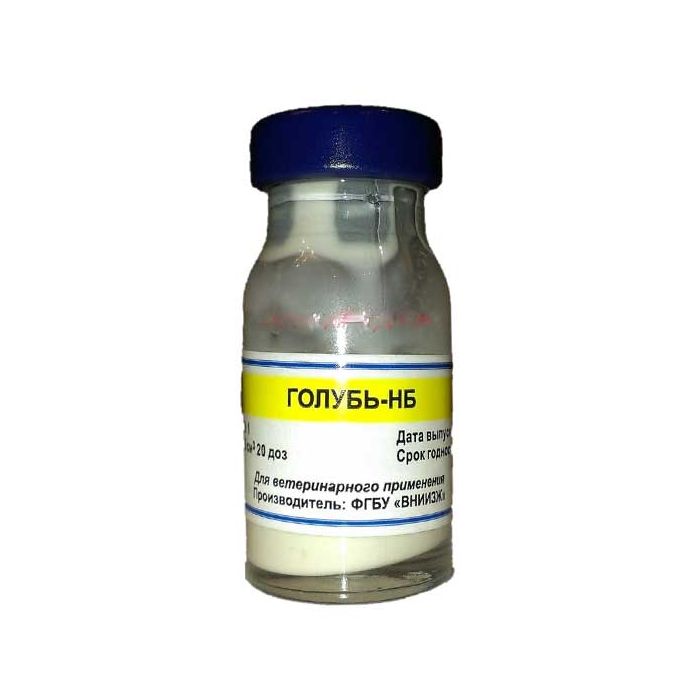Vaccine Pigeon NB inactivated against Newcastle disease for pigeons, vial of 20 doses of 5 ml
DESCRIPTION
Dove-NB - inactivated vaccine against Newcastle disease for pigeons. The dosage form is an emulsion for injection. In appearance, the vaccine is a uniform white emulsion. During storage, slight stratification of the emulsion is allowed, the homogeneity of which is restored with vigorous stirring.
COMPOSITION
The vaccine is made from extraembryonic fluid of chicken embryos infected with Newcastle disease virus (NB, La Sota strain), inactivated with aminoethylethyleneimine (AEEI) with the addition of an oil adjuvant in a ratio of 30:70.
PHARMACOLOGICAL PROPERTIES
The vaccine belongs to the pharmacotherapeutic group of immunobiological drugs.
The PIGEON-NB vaccine induces the formation of an immune response in pigeons to the causative agent of Newcastle disease 21 days after a single use, lasting at least 6 months.
The vaccine is harmless and has no medicinal properties.
DOSAGE AND APPLICATION
The vaccine is intended for the prevention of NB in ​​pigeons in prosperous, threatened and dysfunctional farms.
Pigeons are vaccinated from 35 days of age, followed by revaccination after 6 months. Pedigree show pigeons are vaccinated 25-30 days before the show, and all pigeons newly introduced to the farm during the quarantine period. Adult pigeons are vaccinated annually.
Before use, the vaccine is kept for an hour at a temperature of 20-25 В° C. Heating the vaccine in a water bath and heating devices is prohibited. Before use, the vaccine bottle is shaken thoroughly to restore the uniformity of the emulsion.
The vaccine is administered in a volume of 0.25 cm3 intramuscularly in the area of ​​the pectoral muscle.
For vaccination use sterile disposable syringes with fine needles. The injection site is disinfected with a 70% ethyl alcohol solution or other disinfectant solution.
21 days after vaccination, the immunity intensity is monitored by examining at least 25 blood serum samples in the RTGA. Vaccination is considered successful if in at least 80% of vaccinated birds the average titer of antibodies to NB virus is at least 1: 32 in the RTGA.
If the immunity intensity is less than 80%, the birds are subjected to revaccination regardless of the time of the last vaccination.
SPECIAL INSTRUCTIONS
Symptoms of manifestation of NB and / or other pathological signs in case of an overdose of the vaccine have not been established.
The vaccine does not cause a clinically pronounced post-vaccination reaction. In some cases, a small swelling may form at the injection site, which spontaneously disappears within 1 week.
Adult birds are vaccinated no later than 3 weeks before mating.
CONTRAINDICATIONS
It is forbidden to vaccinate clinically sick and weakened birds.
SIDE EFFECTS
When using the vaccine in accordance with this instruction, side effects and complications, as a rule, are not noted.
The use of the GOLUB-NB vaccine in conjunction with other immunobiological and medicinal products (antibiotics, sulfonamides, etc.) is prohibited. It is forbidden to vaccinate the bird with other vaccines within 5 days after immunization. Chemotherapeutic agents should not be used 3-5 days before vaccination and 5-7 days after vaccination.
SHELF LIFE AND STORAGE
The shelf life of the vaccine is 12 months from the date of issue, subject to storage and transportation conditions. After the expiration date, the vaccine is not suitable for use. The vaccine is stored and transported in a dry dark place at a temperature of 2 В° C to 8 В° C. Freezing of the drug is not allowed.
PACKAGING
The vaccine is packaged in 5 ml (20 doses) in sterile glass or plastic bottles of appropriate capacity, hermetically sealed with rubber stoppers, reinforced with aluminum caps. Vaccine vials are packed in cardboard or expanded polystyrene boxes with sockets and partitions to ensure their immobility and integrity. Each box contains instructions for using the vaccine.
Specifications
Bonus points
0
KolVUP
20
Manufacturer
BioFarmGarant
Temperature regime
from +2 to +8
Teaser
against Newcastle disease for pigeons

